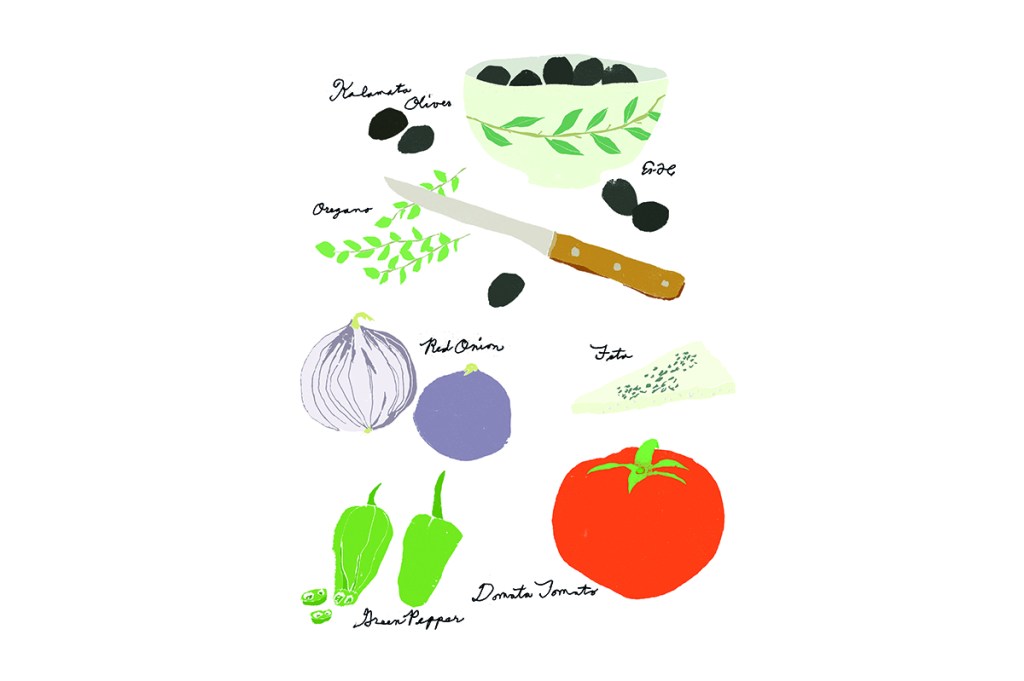Time to send your kitchen knives out for sharpening. The hot weather is coming, and you know what that means: Greek salad, or horiatiki as the Greeks call it.
Is there any pleasure in life quite like dicing tomatoes, cucumbers and peppers with a knife that balances properly in the palm, whose blade possesses just the right steely flex and strength, and — above all — that is properly sharpened? With the right edged tool, it is hard to stop cutting things up for Greek salad. With the right ingredients, it is hard to stop eating it.
This is why Greek salad is the perfect dish to make for a dinner party. As your friends buzz about the kitchen, drinks in hand, you can chop away on autopilot, chatting merrily as your cutting board fills with heaped tomato chunks. When you suddenly return to reality and realize you’ve cut enough for an army — voilà, the army, or at least a battalion of guests, is on site, ready to eat it! Besides, the salad is a nearly foolproof crowd-pleaser. It always disappears, particularly if the rest of the meal has featured wine, red meat, or anything at all rich or fatty. The acerbic zing of the vinegar, the saltiness of the cheese and the relief of the cool tomato offer the ideal palate cleanser.
Like pizza, Greek salad has traveled far from its homeland and picked up a lot of baggage en route. Believe it or not, for the originalist, lemon plays no part. Dried oregano is the only spice permitted; feta (from Greece) is to be served as a slab on top of a helping, not crumbled or cubed; no vegetables but tomatoes, green peppers, olives and red onions are admitted.
But there are no culinary originalists outside the Mediterranean. We Anglos occasionally fancy ourselves food purists. In reality, we have no idea. Never will we experience anything approximating the passionate fury that erupts in the bosom of a Frenchman who has discovered corn in his salade niçoise. There are things that we care about, like the proper ingredients of Caesar dressing, but if anchovies are absent our displeasure extends, at most, to refusing to eat the disappointing dish. Never in our wildest dreams would we found the Golden Circle of Caesar Salad Inspectors to travel North America from sea to shining sea, forcing chefs from New York to LA to shape up or be shamed out of business. Nor would we dream of establishing an elaborate legal framework to handle recalcitrant garde-mangers who continue, despite repeated warnings, to sully the cognomen of Caesar with kale and roasted chickpeas. There are more things in heaven and earth, America, than are dreamed of in your philosophy.
Nowhere is this cultural attitude better exemplified than with Greek salad. People put lemon in it. Everyone is thrilled. People skip the onion. Fine. People add red and yellow peppers — all to the good. People crumble the feta, that’s an improvement. Peo- ple add lettuce — now hold on, there we’ve crossed a line. There should be no lettuce in Greek salad. Nor should there be pasta. However, if somebody somewhere wants to put some in — very quietly and discreetly, without making a big song and dance about it and suggesting that other people follow their example — the fabric of society, while certainly strained, will probably withstand the shock.
However, there are sound reasons not to put lettuce or fusilli in Greek salad. It is because Greek salad is a symphony whose theme is the tomato — preferably tomato freshly picked from the kitchen garden, sweetened in the hot summer sun. More filler material means less tomato, thus drowning out the song and substance of the salad. The olives, the oil and vinegar, the cucumber are only ladies- and gentlemen-in-waiting upon the tomato. Even the feta is only there to make the tomatoes taste better.
Ancient Greeks did not have tomatoes, of course, as the plump red fruit only reached Europe in the sixteenth century. But they did have a kind of feta, or sheep’s cheese at any rate (authentic Greek feta is made of sheep’s milk, with a small percentage of goat milk allowed). Homer tells us that the Cyclops kept sheep’s cheese in his cave — a snack enjoyed by Odysseus and his men, who munched on it in the one-eyed monster’s absence. The Cyclops was in fact quite the cheesemaker, with a designated dairy area and an impressive array of drying racks, straining baskets and pails and vessels of all types brimming with whey.
But the arrestingly salty feta is best enjoyed in contrast with something else, like tomatoes. Perhaps this is why the Cyclops was so pleased to vary the monotony by eating up a few of Odysseus’ crewmen (a dietary indulgence that ultimately had health consequences, especially for his eyesight).
This contrast lies at the root of the purist rule of serving the feta in a slab on top of the salad instead of crumbling it. The idea is that the diner should control the contrast between the feta and the rest. When it’s in a slab, you can decide the proportion of salty, assertive feta in each bite for yourself. Personally, though, I love having the crumbled feta coating everything in the salad and swimming happily in the dressing, eventually to be mopped up with a piece of crusty bread and devoured.
Greek salad supposedly originated as a rustic lunch. Farmers would carry out a tomato, a piece of cucumber, some olives and a slice of feta out to the field wrapped in a cloth. Come lunchtime they would slice it all up with a knife and enjoy it with a hunk of bread. It sounds delightfully civilized.
For some reason, however, the peasant connection leads some chefs to hew the vegetables in large, ungainly pieces that are allegedly rustic. This is terribly condescending to Greek peasants, who may have been eating in the fields but surely did not inhale their food by the cubic foot. Rusticity is all very well, but as a simple rule of thumb, the diner should not have trouble distinguishing between a plate of salad and a heap of split logs. Besides, small, bite-sized pieces marinate more effectively in the dressing and are much more pleasant to eat.
As always, the key to keeping a tradition alive is balance: embrace organic development like lemon juice and capers, but reject Trojan horses that hijack the spirit of the salad, like lettuce, pasta or, heaven forbid, shrimp. That said, when it comes to horiatiki, Greeks bearing gifts are not to be feared but welcomed.
This article was originally published in The Spectator’s June 2022 World edition.

























